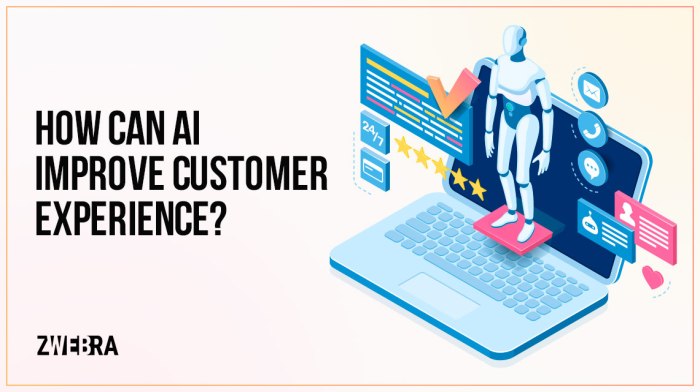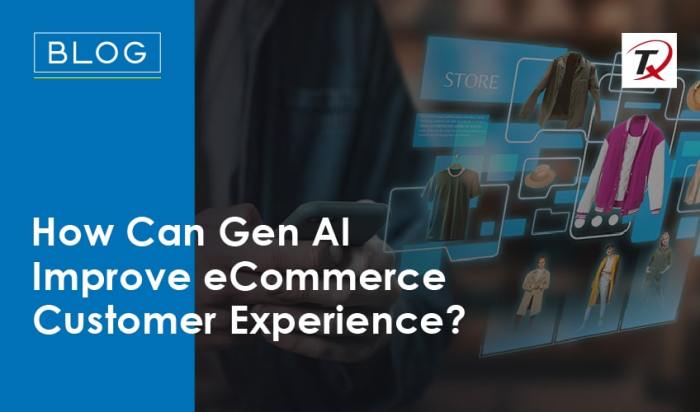In today’s digital age, artificial intelligence (AI) is revolutionizing the way customers experience online shopping. From personalized recommendations to instant customer support, AI is reshaping the ecommerce landscape in unprecedented ways. Let’s delve into how AI is redefining customer experience in ecommerce.
Overview of AI in Ecommerce Customer Experience

AI technology has significantly reshaped the landscape of customer experience in the realm of ecommerce. By leveraging artificial intelligence, online shopping platforms can offer personalized and seamless interactions that cater to the unique preferences and needs of each individual customer.
This transformative technology plays a crucial role in enhancing user engagement, streamlining processes, and ultimately driving higher customer satisfaction levels.
AI Applications in Enhancing Customer Interactions
- Chatbots: AI-powered chatbots are being used by ecommerce websites to provide instant customer support, answer queries, and guide users through their shopping journey.
- Recommendation Engines: By analyzing user behavior and preferences, AI algorithms can suggest relevant products to customers, increasing the likelihood of conversions.
- Personalization: AI enables ecommerce platforms to deliver tailored content, product recommendations, and promotions based on individual customer data, enhancing the overall shopping experience.
Benefits of Utilizing AI Technologies
- Improved Customer Engagement: AI helps in creating meaningful interactions with customers, driving higher engagement levels and fostering brand loyalty.
- Enhanced Decision-Making: By providing valuable insights from data analysis, AI empowers ecommerce businesses to make informed decisions that optimize user experiences.
- Efficiency and Automation: AI streamlines processes such as inventory management, order fulfillment, and customer service, leading to operational efficiency and cost savings.
Personalized Shopping Experiences

In the world of ecommerce, personalized shopping experiences have become increasingly important in engaging customers and driving sales. Artificial intelligence (AI) plays a crucial role in revolutionizing how online retailers can tailor their offerings to individual customers, ultimately enhancing customer satisfaction and loyalty.
AI-Driven Product Recommendations
AI algorithms analyze vast amounts of customer data, including browsing history, purchase behavior, and demographic information, to create personalized product recommendations. By understanding each customer’s preferences and interests, AI can suggest relevant products that are more likely to resonate with the individual, leading to higher conversion rates and increased customer engagement.
- AI algorithms can identify patterns in customer behavior to anticipate future needs and preferences.
- Traditional ecommerce platforms often rely on manual segmentation and generic recommendations, which may not be as effective in capturing individual customer preferences.
- Personalized product recommendations can lead to higher average order values and increased customer lifetime value.
Enhanced Customer Satisfaction
AI-driven personalized shopping experiences go beyond just recommending products; they also enable retailers to create tailored marketing campaigns that speak directly to each customer’s interests and needs. By delivering relevant content and promotions, ecommerce businesses can enhance customer satisfaction and foster long-term relationships with their clients.
- AI can analyze customer interactions in real-time to deliver personalized marketing messages at the right moment.
- Personalized marketing campaigns can significantly increase engagement and conversion rates compared to generic promotions.
- Customers are more likely to return to a platform that understands their preferences and provides a seamless shopping experience tailored to their needs.
Chatbots and Virtual Assistants
AI-powered chatbots and virtual assistants have revolutionized customer service in ecommerce by providing instant support and guidance to shoppers. These intelligent tools leverage artificial intelligence to interact with customers, answer queries, and offer personalized recommendations, enhancing the overall shopping experience.
Impact of AI-powered Chatbots and Virtual Assistants
Chatbots and virtual assistants play a crucial role in streamlining customer service in ecommerce. They are available 24/7 to assist customers, provide real-time responses, and guide them through their shopping journey. By leveraging natural language processing and machine learning algorithms, these AI-driven tools can understand customer inquiries, offer relevant product suggestions, and address concerns promptly.
- Chatbots improve the shopping experience by offering instant support: Customers can get immediate assistance with product inquiries, order tracking, or issue resolution without having to wait for a human agent. This leads to faster problem resolution and increased customer satisfaction.
- Personalized recommendations: Chatbots analyze customer behavior, preferences, and purchase history to offer personalized product recommendations. This tailored approach enhances the shopping experience and increases the likelihood of conversion.
- Seamless communication: Chatbots provide a seamless communication channel for customers to interact with the brand. Whether it’s through text-based chat or voice commands, chatbots ensure that customers can easily reach out for help or information.
Advantages of Using Chatbots for Customer Queries
Using chatbots for handling customer queries and providing real-time assistance offers several advantages for ecommerce businesses. These include:
- Cost-effective customer service: Chatbots reduce the need for human agents to handle repetitive queries, saving time and resources for the business.
- Scalability: Chatbots can handle multiple customer inquiries simultaneously, allowing businesses to scale their customer support operations efficiently.
- 24/7 availability: Chatbots operate round the clock, ensuring that customers can receive assistance at any time of the day, leading to improved customer satisfaction and loyalty.
Predictive Analytics for Customer Insights
AI-driven predictive analytics play a crucial role in helping ecommerce businesses gain valuable insights into customer behavior and preferences. By analyzing vast amounts of data, AI algorithms can predict future trends and provide valuable information that can be used to enhance the overall customer experience.
Forecasting Trends and Optimizing Marketing Strategies
Predictive analytics in ecommerce involves analyzing historical data to identify patterns and trends, which can then be used to forecast future customer behavior. By leveraging machine learning algorithms, businesses can predict which products are likely to be popular, identify potential high-value customers, and optimize marketing strategies accordingly.
This allows businesses to personalize their offerings and target customers more effectively, ultimately leading to increased sales and customer satisfaction.
- Utilizing purchase history and browsing behavior to recommend personalized product suggestions to customers.
- Forecasting demand for specific products based on seasonal trends, customer preferences, and external factors.
- Segmenting customers based on their behavior and preferences to tailor marketing campaigns and promotions.
- Optimizing pricing strategies by analyzing competitor pricing, customer sentiment, and market trends.
Anticipating Customer Needs and Enhancing Shopping Experience
Predictive analytics can also be used to anticipate customer needs and provide a seamless shopping experience. By analyzing data such as past purchases, search queries, and customer feedback, businesses can predict what customers are likely to buy next and offer relevant recommendations.
This level of personalization helps build customer loyalty and increases the likelihood of repeat purchases.
- Implementing personalized email campaigns based on predictive analytics to target customers with relevant offers and promotions.
- Utilizing chatbots and virtual assistants powered by predictive analytics to provide real-time assistance and recommendations to customers.
- Using predictive analytics to optimize inventory management and ensure that popular products are always in stock.
- Enhancing product recommendations on the website or app based on predictive analytics insights to improve cross-selling and upselling opportunities.
Conclusion
As we wrap up our exploration of how AI is transforming customer experience in ecommerce, it’s evident that AI is here to stay and will continue to shape the future of online shopping. Embracing AI technologies opens up a world of possibilities for businesses looking to provide seamless, personalized experiences for their customers.
The era of AI-driven ecommerce is upon us, and the possibilities are endless.
General Inquiries
How does AI improve customer interactions on ecommerce platforms?
AI enhances customer interactions by analyzing data to provide tailored product recommendations, personalized marketing campaigns, and instant customer support through chatbots and virtual assistants.
What are the benefits of using predictive analytics in ecommerce?
Predictive analytics help businesses understand customer behavior, forecast trends, and optimize marketing strategies, leading to better customer insights and an enhanced shopping experience.



